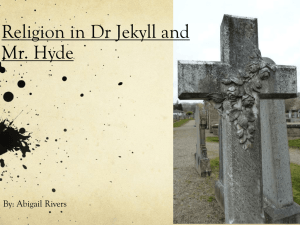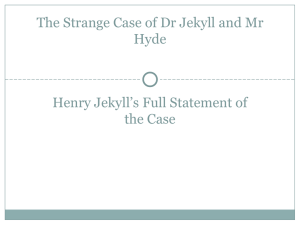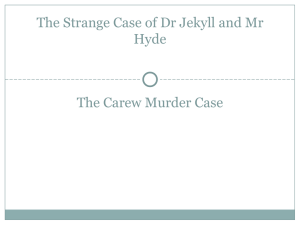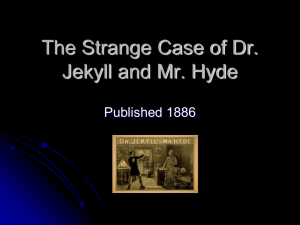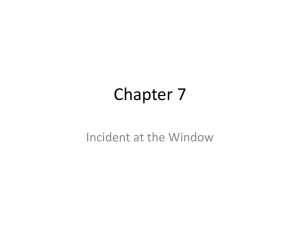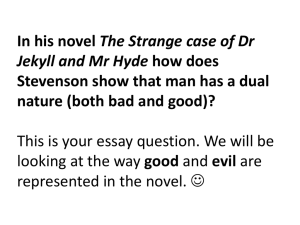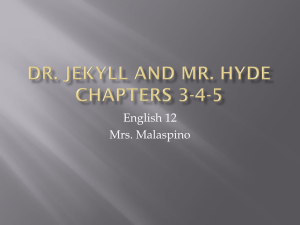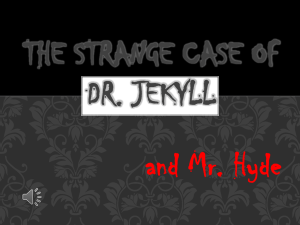2009 Moffat Workshop
advertisement
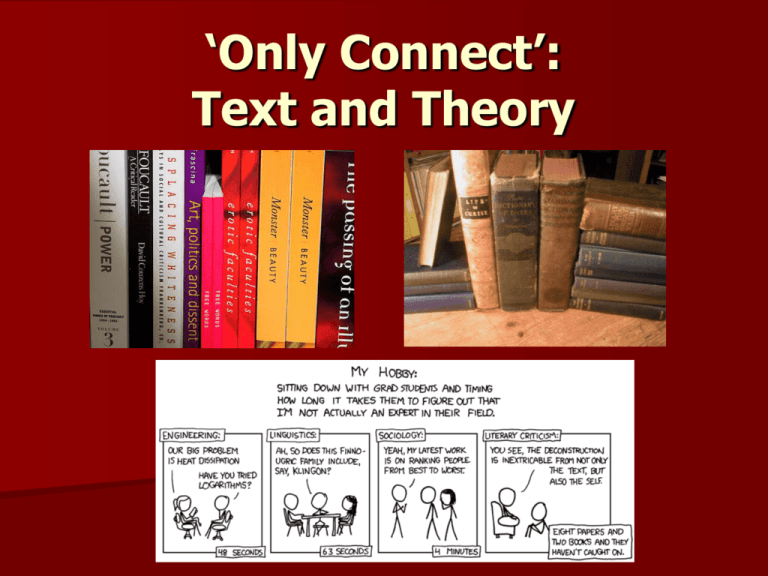
‘Only Connect’: Text and Theory What We Read Children’s Literature Sci-Fi The Canon Shakespeare Detective Fiction Milton Tennyson Wordsworth Keats Thriller Dickens Jane Austen Popular Culture Chick Lit What We Read Hamlet Batman Atonement Harry Potter Survivor The Reader Whale Rider Pride and Prejudice How We Read Author Text Reader •Stable meaning •Task of reader to work out author’s intention How We Read ‘The death of the author is the birth of the reader.’ Roland Barthes Background Author Text Reader Ideology •Reader Response •Meanings – fluid, flexible, multiple Society Culture How We Read Literary Theory: Different ways of approaching, looking at text Fashions come and go, new theories and approaches invented Examples: New Historicist Post-colonial Marxist Psychoanalytic Feminist Advantages Reader centre stage Multiplicity Different voices heard Connections between texts: links, commonalities, divergences, intertextuality BUT: Still need textual analysis, support How We Read Texts New Historicist: Text in historical context Text shaped by cultural, political, ideological world in which produced For Example: Hard Times – 19th trade union movement, education act The Tempest – exploration and discovery The Captive Wife – convicts, cultural contact, 19th attitudes towards women How We Read Texts Post-colonial: Examine representations of race, Empire, power imbalance Indigenous voice/perspective For Example: The Tempest – Ariel and Caliban indigenous, Prospero as coloniser Mansfield Park – Edward Said – society/wealth founded on slave trade (Antigua) Salman Rushdie, Witi Ihimaera, Patricia Grace How We Read Texts Marxist: Class struggle key feature of history, human interaction How do texts represent society, class? For Example: Wuthering Heights – Heathcliff’s pursuit of wealth and power Jane Eyre – Jane a ‘lady’, inheritance secures her class position How We Read Texts Psychoanalytic: Freud – loss experienced upon separation from mother’s body, id versus ego Jungian archetypes, collective unconscious Jacques Lacan – structure of self and relation to the social, mirror stage For Example: Bruce Wayne and Batman – ego and id, chaos and order Bertha in Jane Eyre – the suppressed self Goblin Market – sexuality and desire How We Read Texts Feminist: Representation of women in literature Desire to recover ‘silenced’ writers Patriarchal structure of society and language For Example: Jane Austen – predicament of 18th Century women Aphra Behn, Dorothy Wordsworth, Louisa Baker, Dorothy Parker John Donne – ‘she is all states, all Princes I’; ‘Ah my America, my new found land’ – male conqueror critiqued Dr Jekyll and Mr Hyde Robert Louis Stevenson Charles Darwin Origin of Species (1859) Evolutionary Scale: Natural Selection ‘Civilised’ Man ‘Savage’ Ape Atavistic Criminal Cesare Lombroso, Criminal Man (1876): Ears of unusual size, standing out from the head as do those of the chimpanzee Nose twisted, upturned, or flattened in thieves, or aquiline or beak-like in murderers, or with a tip rising like a peak from swollen nostrils. Lips fleshy, swollen, and protruding Chin receding, or excessively long, or short and flat, as in apes. Abnormally hairy Excessive length of arms, extra fingers and toes New Historicist Reading Jekyll: Genial Doctor -‘a large, well-made, smoothfaced man of fifty, with something of a slyish cat perhaps, but every mark of capacity and kindness…’ Hyde: Ape-Like, Deformed, Atavistic Criminal -‘impression of deformity…hardly human…something troglodytic…’ -‘ape-like fury’ -‘like a monkey’ -‘animal terror’ -‘face…great muscular activity…debility of constitution’ -‘hand…corded and hairy’ -‘ape-like tricks’, ‘ape-like spite’ Post-Colonial and Marxist Readings Superiority/Evolved Nature of ‘Civilised’ Man an Illusion Crimes of a Middle Class Man Jekyll/Hyde ‘Primitive’ Lurks Within No Sense of Evolutionary Progress Hyde: Middle Class, Hyde Described As ‘Gentleman’ Sigmund Freud Studies on Hysteria, 1895 Id – instinctual self , location of desires, repressed because socially unacceptable, a threat to the ego (pleasure principle) Ego – conscious self (reality Principle) Superego – conscience (internalisation of punishments and warnings) and ego ideal (shaped by rewards and positive models) Return of the Repressed – can never banish id, will emerge at some point Psychoanalytic Reading Ego Ideal: Respected, Charitable Doctor Conscience: Wrong to Indulge Desires Superego Ego: Jekyll The Return of The Repressed… AntiCalvinist Allegory Id: Hyde ‘his wonderful selfishness and circumscription to the moment…’ ‘his every act and thought centred on self; drinking pleasure with bestial avidity…’ Study in Addiction Attraction of altered state (Hyde) Dependency on/ enslavement by Hyde Illusion of self-control, belief can be free of Hyde when choose Concealment, manipulation of others Compulsive behaviour Despair, retreat into pathological reclusiveness, underworld Inability to achieve desired effect Triumph of Hyde Jekyll compares self with ‘drunkard’ Feminist Reading? ‘Weeping like a woman or a lost soul…’ Hyde as the Repressed Feminine? Hyde as Product of Male Environment Queer Studies Reading? ‘…the more it looks like Queer Street, the less I ask’ The Back Door A Warning: Text and Context Belonging or Alienation? Settler Indigenity ‘It is only by going native that the European arrivant can become native.’ (Terry Goldie) ‘To surrender the furnishings of a culture both European and bourgeois is to come into the sensuality of a “natural occupancy” of the new land. The pleasure afforded by these fictions is that they allow the heirs of a settler society to imagine our unhistoric origin as the possibility of the making of a settlement without a colony.’ (Linda Hardy) ‘Colonial Being’ (Stephen Turner) Colonial New Zealander To be at home/of the new place To be indigenous fantasized history illusory continuity; historical discontinuity myth-making Colonial Being New place like home Eliminate indigenous population Becoming Māori Language and Affection Rechristening Symbolic Wedding Night Moko Baptism Displaced Woman Sacrifice of Self Voice-Over – ‘Sadness’ and ‘Despair’ Dissolving Words Ocean – Symbolic Separator Celtic Theme Tune Mister Pip, Lloyd Jones Post-Modern Power to Reader: Liberation and Transformation Post-Colonial? Exploitation and the Culture of Violence Dickens Appropriated; Oral and Written, Feminine and Masculine Cultural Colonisation? Masculine Voice? Katherine Mansfield, How Pearl Button was Kidnapped Anne Estelle Rice, Katherine Mansfield, 1918 Nigel Brown, Names Painting Katherine Mansfield, 1985-93, Private Collection, Photograph Nicola Topping. How Pearl Button Was Kidnapped New Historicist Reading: Written 1910 New Zealand female suffrage 1885 Maori – fatal impact, assimilation Puritan society – tradition of literary critique of Puritan mindset – Mansfield attacks the ‘box’ mentality of early 20th century New Zealand secular Puritanism How Pearl Button Was Kidnapped Feminist Reading: House, ‘box’, domestic space of conformity and traditional female domestic drudgery ‘In the kitchen, ironing-because-itsTuesday’ Pearl – rebellious, desirous of new horizons and experiences Shedding of ‘shoes and stocking, her pinafore and dress’, freeing from female constraint, expectation How Pearl Button Was Kidnapped Psychoanalytic Reading: Ego Ideal: •mother at home •Boxes = order Conscience: •‘nasty things’ •policemen Archetype: •Socialisation of individual •Fantasy of escape Freud: Journey away from Mother Super-Ego Ego: Pearl Id: Instinctual Self Escape How Pearl Button Was Kidnapped Post-Colonial Reading: Cultural encounter – Maori culture seen as warm, communal, loving, spontaneous; Pakeha culture as restricting, sterile and claustrophobic Maori stereotypes – ‘fat’, ‘dusty’, ‘naked’, admiring of Pearl’s ‘yellow curls’ Witi Ihimaera’s ‘The Affectionate Kidnappers’ – ‘a tamariki all alone – no good’, ‘gone into darkness, gone into the stomach of the Pakeha …eaten up by the white man’ How Pearl Button Was Kidnapped Marxist Reading: Bourgeois Pakeha society: individual ownership = conformity, alienation, ‘nasty things’ Maori society: communal, warmth, laughter Pearl instinctively Marxist in outlook and preferences Bibliography: Literary Theory Gregory Castle, The Blackwell Guide to Literary Theory (2007) Jonathan Culler, Literary Theory: A Very Short Introduction (Oxford UP 1997) Terry Eagleton, Literary Theory: An Introduction (Minnesota UP 1996) Patricia Waugh, ed., Literary Theory and Criticism: An Oxford Guide (2006) Bibliography: Mister Pip, River Queen John Lovell, Mister Pip Teacher’s Guide (Longman, 2008) Jennifer Lawn, ‘What the Dickens: Storytelling and Intertextuality in Lloyd Jones’ Mister Pip,’ in Floating Worlds: Essays on Contemporary New Zealand Fiction, ed. Anna Jackson and Jane Stafford (Victoria University Press, 2009)pp 142-63 Mark Llewellyn, ‘What is Neo-Victorian Studies?’ NeoVictorian Studies 1:1 (2008) pp. 177-180 on Mister Pip Bruce Babington, ‘What Streams May Come: Navigating Vincent Ward’s River Queen’ Illusions Winter (2008) pp. 9-13 Kirstine Moffat, ‘The River and the Ocean: Indigenity and Dispossession in River Queen’ Moving Worlds, Special Issue: New New Zealand, 8:2 (2009) pp. 94-106
